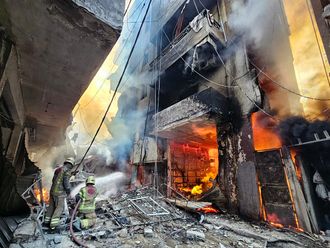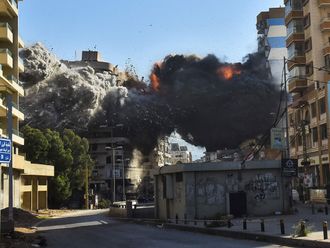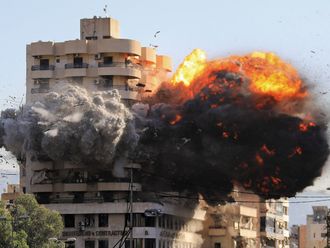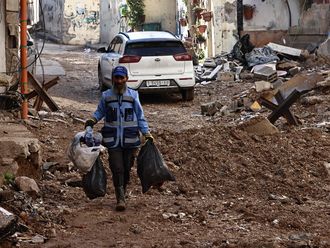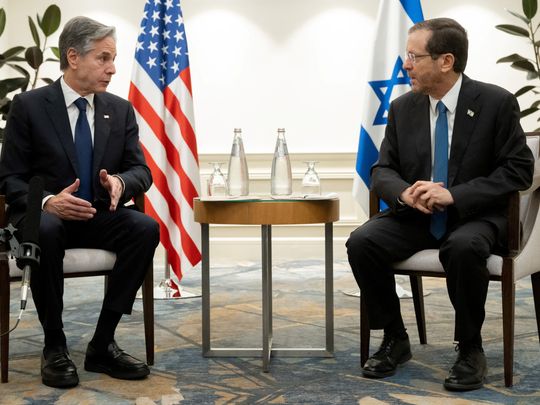
TEL AVIV: US Secretary of State Antony Blinken said Thursday during a visit to Israel that a temporary truce in the Israel-Hamas war was “producing results” and should continue.
As part of the pause in fighting, now in its seventh day, Hamas has released scores of hostages taken during its bloody attack on Israel on October 7 in exchange for the release of more than 200 Palestinian prisoners being held in Israeli jails.
“We have seen over the last week the very positive development of hostages coming home, being reunited with their families,” Blinken said at a meeting with Israeli President Isaac Herzog in Tel Aviv.
“It’s also enabled an increase in humanitarian assistance to go to innocent civilians in Gaza who need it desperately.
“So this process is producing results. It’s important, and we hope that it can continue.”
Meetings with Netanyahu, Abbas
Blinken, in the region for a third time since the war began, is also expected to meet Israeli Prime Minister Benjamin Netanyahu and Palestinian president Mahmoud Abbas in Ramallah.
Before he arrived, Blinken said his trip would focus on extending the truce to ensuring the release of more hostages and the continued delivery of aid into the Gaza Strip.
Earlier, Israel and Hamas agreed to extend their ceasefire by another day, just minutes before it was set to expire. The truce in Gaza appeared increasingly tenuous as most women and children held by the militants have already been released in swaps for Palestinian prisoners.
As word of the extension came Thursday morning, gunmen opened fire on people waiting for buses where a main highway from Tel Aviv enters Jerusalem, killing at least three people and wounding several others, according to police.
Police said the two attackers were killed. It was unclear if the attack was carried out by a Palestinian militant group or individuals acting on their own, or if it would have any impact on the truce in Gaza.
International pressure has mounted for the cease-fire to continue as long as possible after nearly eight weeks of Israeli bombardment and a ground campaign in Gaza that have killed thousands of Palestinians, uprooted three quarters of the population of 2.3 million and led to a humanitarian crisis.
Blinken said “my heart goes out” to the victims of the Jerusalem attack. Blinken is expected to press for further extensions of the truce and the release of more hostages.
“This process is producing results. It’s important, and we hope that it can continue,” he said.
Qatar, which has played a key role in mediating with Hamas, said the truce was being extended under the same terms as in the past, with Hamas releasing 10 Israeli hostages per day in exchange for Israel’s release of 30 Palestinian prisoners.
The announcement followed a last-minute standoff, with Hamas saying Israel had rejected a proposed list that included seven living captives and the remains of three who the group said were killed in Israeli airstrikes. Israel later said Hamas submitted an improved list, paving the way for the extension.
The talks appear to be growing tougher, with Hamas having already freed most of the women and children captured during the deadly October 7 attack on Israel that triggered the war. The militants are expected to make greater demands in return for freeing men and soldiers.
Israel says it will maintain the truce until Hamas stops releasing captives, at which point it will resume its offensive aimed at eliminating the group. With Israeli troops holding much of northern Gaza, a ground invasion south — where most of Gaza’s population is now concentrated — will likely bring an escalating cost in Palestinian lives and destruction.
The Biden administration has told Israel that if it launches an offensive in the south, it must operate with far greater precision.
INCREASINGLY TENSE HOSTAGE TALKS
The plight of the captives and shock from Hamas’ October 7 attack in southern Israel have galvanized Israeli support for the war. But Netanyahu is under pressure to bring the hostages home and could find it difficult to resume the offensive if there’s a prospect of more releases.
The initial truce, which began on Friday and had already been extended once, calls for the release of women and children. Israeli officials say Gaza militants still hold around 20 women, who would all be released in a few days if the swaps continue at the current rate.
After that, keeping the truce going depends on tougher negotiations over the release of around 126 men Israel says are held captive, including several dozen soldiers.
For men — and especially soldiers — Hamas is expected to push for comparable releases of Palestinian men or prominent detainees, a deal Israel may resist.
So far, most Palestinians released have been teenagers accused of throwing stones and firebombs during confrontations with Israeli forces. Several were women convicted by Israeli military courts of attempting to attack soldiers. Palestinians have celebrated the release of people they see as having resisted Israel’s decades-long military occupation of lands they want for a future state.
An Israeli official involved in hostage negotiations said talks on a further extension for release of civilian males and soldiers were still preliminary, and that a deal would not be considered until all the women and children are out. The official spoke on condition of anonymity because negotiations were ongoing.
With Wednesday’s releases, a total of 73 Israelis, including dual nationals, have been freed during the six-day truce, most of whom appear physically well but shaken . Another 24 hostages — 23 Thais and one Filipino — have also been released. Before the ceasefire, Hamas released four hostages, and the Israeli army rescued one. Two others were found dead in Gaza.


